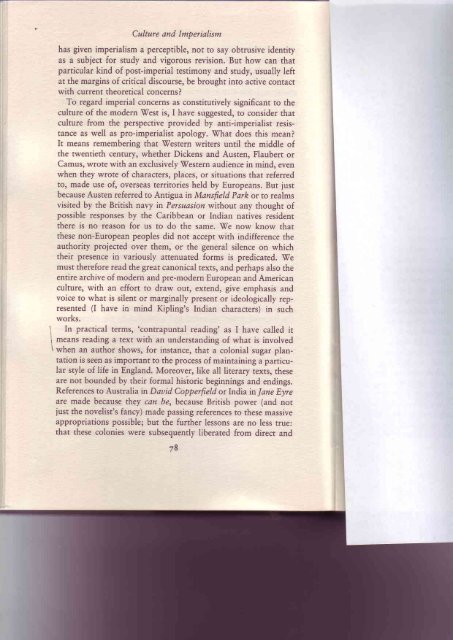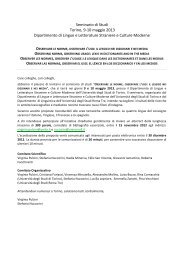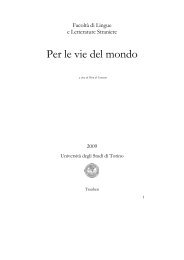Consolidated Vision
Consolidated Vision
Consolidated Vision
Create successful ePaper yourself
Turn your PDF publications into a flip-book with our unique Google optimized e-Paper software.
Cubure and Imperialism<br />
has given imperialism a perceptible, not to say obtrusive identity<br />
as a subiect for study and vigorous revision. But how can thar<br />
particular kind of post-imperial testimony and study, usually left<br />
at the margins of critical discourse, be brought into active conracr<br />
with current theoretical concerns?<br />
To regard imperial concerns as consritutively significant to the<br />
culture of the modern Vest is, I have suggested, to consider that<br />
culture from the perspective provided by anti-imperialist resistance<br />
as well as pro-imperialist apology. tùlhat does this mean?<br />
It means remembering that Western writers until the middle of<br />
the t'wentieth century, whether Dickens and Austen, Flaubert or<br />
Camus, wrote with an exclusively STestern audience in mind, even<br />
when they wrote of characters, places, or situations that referred<br />
to, made use of, overseas territories held by Europeans. But just<br />
because Austen referred to Antigua in Mansfield Park or ro realms<br />
visited by the British navy in Persuasion without any rhoughr of<br />
possible responses by the Caribbean or Indian narives resident<br />
there is no reason for us to do the same. ìùle now know that<br />
these non-European peoples did not accepr with indifference the<br />
authoriry proiected over them, or the general silence on which<br />
their presence in variously attenuated forms is predicated.<br />
'!7e<br />
must therefore read the great canonical texts, and perhaps also the<br />
entire archive of modern and pre-modern European and American<br />
culture, with an effort to draw out, extend, give emphasis and<br />
voice to what is silent or marginally present or ideologically represented<br />
(I have in mind Kipling's Indian characters) in such<br />
works.<br />
\ h practical terms, 'conrrapuntal reading' as I have called it<br />
i means reading a text with an understanding of what is involved<br />
i when an author shows, for instance, that a colonial sugar plantation<br />
is seen as important to the process of maintaining a particular<br />
style of life in England. Moreover, like all literary rexrs, these<br />
are not bounded by their formal hisioric beginnings and endings.<br />
References to Australia in Dauid Copperfield or India in lane Eyre<br />
are made because they can be, because British power (and not<br />
just the novelist's fancy) made passing references to these massive<br />
appropriations possible; but the further lessons are no less rrue:<br />
that these colonies were subsequenrly liberated from direct and<br />
z8





